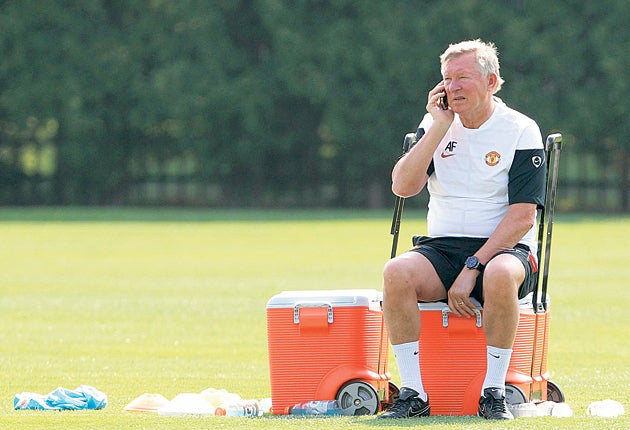Ferguson demands winter break... from 3,000 miles away after eight-hour flight
England's players are burnt out, we are told, but that doesn't stop most Premier League teams from gallivanting halfway around the world for pre-season friendlies – now Harry Redknapp has finally admitted that it's all about the money

Your support helps us to tell the story
From reproductive rights to climate change to Big Tech, The Independent is on the ground when the story is developing. Whether it's investigating the financials of Elon Musk's pro-Trump PAC or producing our latest documentary, 'The A Word', which shines a light on the American women fighting for reproductive rights, we know how important it is to parse out the facts from the messaging.
At such a critical moment in US history, we need reporters on the ground. Your donation allows us to keep sending journalists to speak to both sides of the story.
The Independent is trusted by Americans across the entire political spectrum. And unlike many other quality news outlets, we choose not to lock Americans out of our reporting and analysis with paywalls. We believe quality journalism should be available to everyone, paid for by those who can afford it.
Your support makes all the difference.When Sir Alex Ferguson argued about the need for a winter break in England, he was more than 3,000 miles – and an eight-hour flight – away from home. But his Manchester United squad had not travelled to Philadelphia directly, they had already played Celtic in Toronto.
The irony will not be lost on those at the Premier League and Football Association. Ferguson is not alone in raising concerns about the England team being "handicapped" by such a long, hard slog of a season, nor is he the only manager to take his team on a long-haul flight to play pre-season friendlies.
Blackburn Rovers and Everton undertook the longest journeys, to Australia, while Birmingham City played in China, and United, Manchester City and Tottenham Hotspur have crossed the Atlantic Ocean.
"These trips now are so different to what we used to make," says the Tottenham manager Harry Redknapp. "You go to China, America or Australia. Don't tell me that is the way to prepare for a pre-season. It's not. You'd rather go to Scotland and have a couple of games up there, but it's all about finance now."
Luckily for Redknapp and Ferguson, their players travelling first-class means aches and strains are unlikely. But there is the simple equation of more matches leading to a greater possibility of injury.
Simon Moyes, orthopaedic surgeon at a sports medicine practice at London's Wellington Hospital, says: "Everyone agrees footballers are having to do far more than they used to, with less time to recover. Playing more matches means more chance of an impact injury or over-use." That "over-use" could be interpreted as burn-out, tiredness or the wear and tear that leads to spells in the treatment room or not playing at full tilt.
Success is possible following a pre-season tour, as Chelsea showed after touring the US a year ago. This time around, with players at the World Cup allowed extra time to recover, the Premier League champions limited their travel to within Europe.
"Last season we played four games in America. Now we decided to stay in Europe because we did not have a lot of players," said Chelsea manager Carlo Ancelotti.
Chelsea's schedule – they play in Holland and Germany – is closer to the pre-seasons of the 1960s and 1970s when Ron "Chopper" Harris was playing. The Stamford Bridge favourite said: "Under Tommy Docherty and Dave Sexton we went away, but not halfway around the world to America – only for a training camp in Sweden or Germany.
"If we did go further, to Australia or the Caribbean, then it was after the season and that was more of a holiday. The big difference is that the players now have a couple of weeks off but we had six or eight weeks. By the end of it you really wanted to start training. You might go for a jog a few days before pre-season but without your team-mates you'd just stop if you were tired."
Contrary to images of boozy, morale-boosting trips away, Harris adds: "There was nothing else you could do but train because you were so far out in the sticks. Where we were in Sweden, it took you two days to get a taxi into town. Now people are moaning about being tired, but clubs have gone to Australia. That's 22 hours on a plane. It's all about money these days."
It could be argued that playing MLS teams offers a chance to play against teams midway through their season; a valuable tool to raise fitness levels.
There is also a window to expand the club's brand. Premier League teams would receive a fee for playing in a friendly but hardly a sum that makes a difference to their overall figures.
Playing friendlies makes foreign fans aware of the club, then there is the possibility they will become customers as well as supporters. Possibly a shirt, or a ticket, possibly a long-term commitment in emerging markets such as internet content.
Football finance expert David Bick, the chairman of Square1 Consulting, said: "Playing games does not generate huge money for the club but it can spread the brand. But I'd still like to see the figures and whether there are vast sums from overseas."
Clocking up the air miles
Pre-season distances travelled:
Blackburn Rovers 23,475
Everton 22,898
Birmingham City 16,561
Tottenham Hotspur 13,733
Manchester City 12,897
Manchester United 12,318
Bolton Wanderers 8,492
Arsenal 3,553
Sunderland 3,428
Aston Villa 3,070
Wolverhampton Wanderers 2,930
Liverpool 2,551
Fulham 1,691
West Ham United 1,650
Chelsea 1,169
Stoke City 1,063
West Bromwich Albion 1,054
Wigan Athletic 925
Blackpool 899
Newcastle United 730
Join our commenting forum
Join thought-provoking conversations, follow other Independent readers and see their replies
Comments